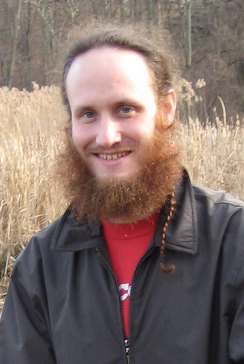More than numbers
Prof. Po-shen Loh (Carnegie Mellon University) will give the 2017 Bullitt Lecture in Mathematics April 12
Revealing the everyday beauty of math
Prof. Jake Wildstrom (Mathematics) relates the everyday importance, and beauty, of mathematics in advance of the 2017 Bullitt Lecture in Mathematics, “Creative math insights for the everyday,” by Dr. Po-Shen Loh (Carnegie-Mellon University),head coach for the U.S. Math Olympiad Team and self-described “math evangelist,” on Thursday, April 13th, at 6:30pm in Natural Sciences Building, Room 112

Prof. Jake Wildstrom, Ph.D. (Mathematics)
By Prof. Jake Wildstrom, Ph.D.
Department of Mathematics
Mathematics is more than just calculation. A mathematical worldview is a way of getting a firmer handle on our assumptions – and having the ability to reject those assumptions when we're wrong. For instance, a martini glass isn’t actually half full when it appears to be. Since the glass is wider at the top, “half full” is surprisingly less than half the volume. A typical guess is that maybe a third of the drink is left – less than half, but not absurdly so. In fact, only an eighth of the drink – less than 13% – is left.
So if you feel like you had more to drink than it looks, you did.
This is simply an example of how quantification of the world around us can change our perceptions. We have an innate number sense which we apply to everything we encounter, but our intuitions can lead us astray in oversimplifying proportions (is "one half" always "one half"?) or in oversimplifying quantities (national budgets end up going in the "very large number" box for a lot of people, and information like, say, how much money we spend on foreign aid is just a big number without context in political machinations).
Math cuts through a lot of those misconceptions. Being able to evaluate a quantity in some sort of context is a strong protection against misinformation, either inadvertent or intentional. And in today’s world, there is a lot of misinformation to weed through.
For example, if I wanted to make a 4% interest rate on a 30-year, $100,000 mortgage sound attractive, I might describe it as getting to own your home for less than $16 per day (true!); if I wanted to make it sound onerous, I might say that by the time you're done, you'd have paid nearly twice the cost of your house (also true!). Being able to figure these things out for yourself, and to realize that they are both valid descriptions of the same reality, is part of developing a nuanced worldview.
Of course, if we get away from the realm of the coldly practical, there's the fact that math can be playful and fun. A simple puzzle can open up a realm of possibilities for exploration.
There is a well-known puzzle to find a counterfeit coin (maybe too heavy, maybe too light; you as the investigator don't know) from among twelve coins by using a two-pan balance scale three times. This is an interesting diversion at best in the real world – but it's a jumping-off point for a curious mind: why twelve? Is it possible to find the counterfeit among thirteen coins? How many coins could you look at if you're allowed to weigh four times? What if there are two counterfeit coins and you have to find both? A simple problem leads to a wealth of exploratory questions, and a millennium or so after the problem was first posed we still have new results.
Does anyone need this result? Probably not (although surprising connections come up all the time in math, and coin-weighing strategies are related to error-correcting communications), but math, like art, finds beauty and elegance to be its own reward, and one need not be a professional mathematician to undertake exploration, or to enjoy the fruits of someone else's explorations.
There's a joy of discovery in pure mathematical structures, that in realms of pure theory certain truths must hold, and that these truths connect in the end to the larger world. There are constant surprises available to the open mind, and math, like nature, is generous to someone inclined to seek out its beauty.
